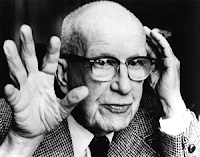Yesterday was suicide prevention day. More American soldiers now die of suicide than in battle. Among teens, suicide is the third leading cause of death. It might be interesting to consider what could be done with the feelings of hopelessness and despair that provoke the reckless disregard for one's own life, not so much trying to numb them with positive thinking or drugs but instead channeling them into a different kind of life. Before talking about what that might mean, I'll tell one of my favorite stories, the story about how Buckminister Fuller convinced himself not to commit suicide.
In 1927, a 32 year-old man stood on the edge of Lake Michigan, ready to throw himself into the freezing waters. He was bankrupt, the result of his third business failure in a row. He’d been drinking heavily and was grief stricken over the death of his first child. He didn’t know how he would support his wife and newborn daughter. At that moment, his life seemed like a pattern of failures to him. Before the bankruptcies, years earlier, he’d been expelled from Harvard during his freshman year and never did complete his degree.
But fortunately, in this moment of drunken grief, Buckminster Fuller had the presence of mind to make an extraordinary decision. He realized that he was about to throw his life away and decided that if he was contemplating that, why not take half a step back and do something unorthodox. Rather than throw his life away, why not throw away his old notions of goals and achievement? He decided to turn his life into an experiment – an experiment to see how much difference one ordinary person could make. [1]

The difference that Fuller’s life made has yet to be fully understood or felt. He was a pioneer of ecological thinking and sustainability – balancing economic and environmental needs. His influence spreads as a growing number of people adopt the thinking that he helped to introduce. Although he never did complete his degree at Harvard, Fuller was awarded 44 honorary doctoral degrees, granted 25 US patents, and authored 28 books.
When Buckminster Fuller turned his life into an experiment (many called him Bucky, but he referred to himself as Guinea Pig B), he created the conditions for an extraordinary life. Perhaps best of all, his failures were feedback for an experiment, not a reflection of who he was, not something to take personally, not a reason to jump. Turning his life into an experiment gave him the best of both worlds: he ended his life even more accomplished than someone driven to achieve to prove something and remained more sanguine than someone who avoided risks altogether.
Perhaps Mohandas Gandhi, Martin Luther King, and Abraham Lincoln did something similar, made a similar sort of commitment. Gandhi pioneered and King popularized non-violent resistance. Letting racists cops or British soldiers do with you what they will is reckless. It's nearly suicidal. Lincoln angered both abolitionists and slave holders by trying to negotiate a compromise that would allow slavery to die out over decades rather than in a violent war.
Gandhi, King, and Lincoln may well have - like Fuller - decided that they had little to lose and an enormous amount to gain by giving themselves over to causes that were dangerous but could change the world. Where people who felt more careful of life may have shied away from such challenges, they seemed to embrace them. (King and Gandhi, who actually did attempt suicide rather than threaten it, seemed more inclined to embrace dangerous causes than Lincoln.)
Maybe one route to suicide prevention is to embrace the realization that fighting to protect a life is doomed to eventual failure whereas fighting to protect an ideal is not. Maybe there are worse things than feeling reckless about one's own life, if the risk taken is for some greater good.
One last note. King, Gandhi, and Lincoln were all assassinated. I wonder if this doesn't just confirm the degree to which they channeled their own suicidal feelings into a sort of courage that reflected a sort of reckless disregard for their own lives.




3 comments:
This is such a great post! I may use it in my class. I love the idea that you are free to take chances when you don't value your life...not that being suicidal is a good thing, but that it creates an opportunity like no other!
Allyson,
thanks for that.
If you use it to provoke discussion, I'd be intrigued to hear what's said, what sort of conversation and questions it provokes.
Happy new school year by the way!
I shared this very important message (thank you for writing it exactly when you did) on Facebook 2 minutes ago: https://www.facebook.com/nandini.stocker/posts/10156886064797558
Post a Comment